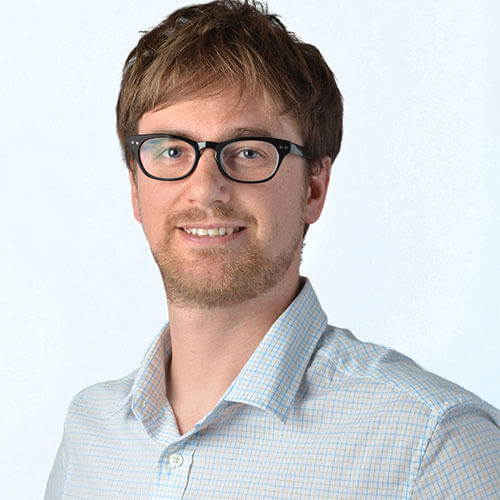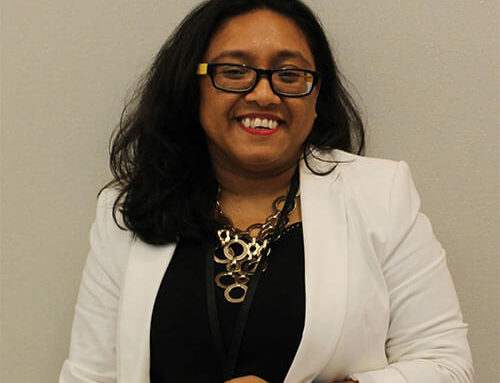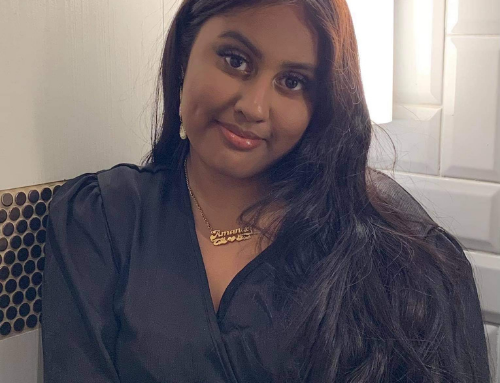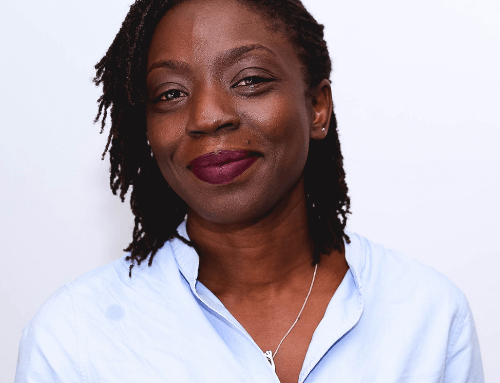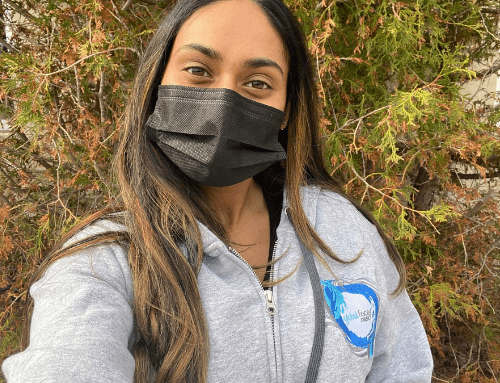Kevin O’Neill, Amref Health Africa in Canada
In December 2017, I was fortunate to have the opportunity to attend an Alternative Rite of Passage ceremony in rural Kenya, where over 435 Maasai girls took part in a festive celebration that graduated them into womanhood without going through female genital mutilation/cutting (FGM/C). In doing so, I was witness to a cultural shift that is underway to abandon a traditional practice that has long held an important place in Maasai culture.
An Alternative Rite of Passage (ARP) is a community-led and community-driven cultural alternative to FGM/C that retains the harmless cultural rituals and celebrations around womanhood while removing the harmful cut for girls. Since Amref Health Africa’s ARP initiative began in 2009, about 15,000 girls in Kenya and Tanzania have transitioned from girlhood to womanhood while avoiding FGM/C. The effectiveness of this model lies in that it is the community itself that has come up with the alternative, and has come to embrace it.
The ARP ceremony took place in Lenkisem, a Maasai village in Kenya’s Kajiado county, near the border with Tanzania. In Kajiado, about 78% of women of reproductive age have undergone FGM/C — well above Kenya’s national average of 21% (DHS, 2014).
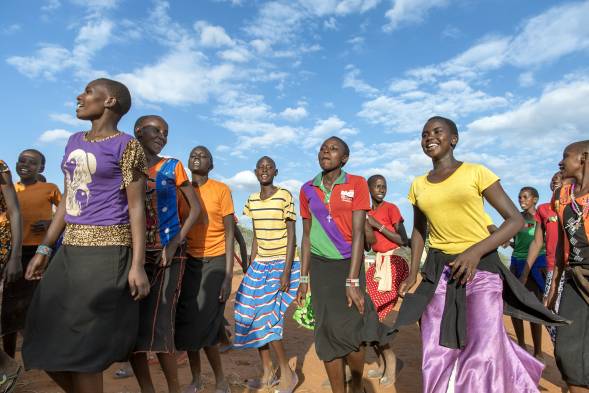
Credit: Jeroen Van Loon
Girls from 10 schools in the area came together for the occasion, which included a three-day training, candlelight celebration, and a formal ceremony. When we arrived, the girls were wrapping up their three-day training on sexual and reproductive health and rights. This segued into final rehearsals for the evening’s candlelight celebration, where each class of girls would perform songs and dances that they had created and rehearsed in the months leading up to this day. Each performance focused on a different aspect of sexual and reproductive health and rights, and the creativity and energy emanating from these performances was so impressive. The evening celebration was a wonderful occasion, which also included a fashion show and a rights quiz.
The next day, over a thousand members of the community showed up for the formal ceremony. Among the guests were the County Governor, Parliamentarians, Senators, local council members, village elders, and traditional circumcizers – all of whom publicly denounced FGM/C for the first time, and vowed to work towards ending the practice.
It was a big deal to have a politician at the level of the County Governor speak publicly and on record to denounce FGM/C. He encouraged the traditional circumcizers to abandon the illegal practice, and to take up alternative income generating activities such as agriculture and livestock. He also brought a large cow as gift to the community, which was part of a feast that took place right after the formal ceremony.
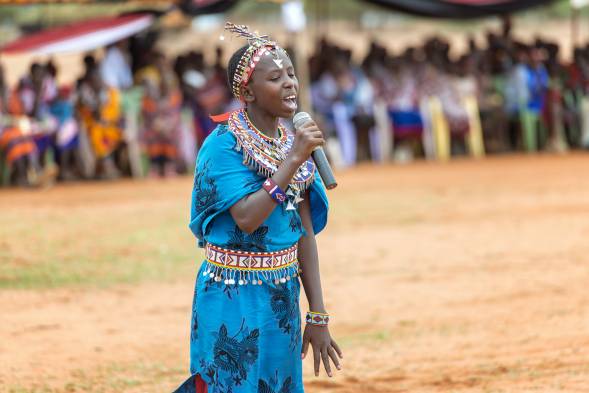
Credit: Jeroen Van Loon
During the formal ceremony a 13-year old girl, Sereya Parit, delivered the fiercest speech. One by one, Sereya addressed each social group gathered at the ceremony – the elders, the politicians, the law enforcers, the cutters, the other girls, etc. – calling squarely upon each group to exercise their power for good to protect the rights of girls, to promote girls’ education and to stop FGM/C. The MC, thinking that Sereya’s speech was carrying on too long, tried fruitlessly to interrupt her several times. But there would be no silencing these girls.
You may know that today, February 6th, is the International Day of Zero Tolerance for Female Genital Mutilation. Eradicating FGM/C in communities requires understanding and respecting traditional values that communities attach to the practice, providing alternatives, helping girls cope with the stigma of not being circumcised, and introducing prevention approaches.
Amref Health Africa addresses FGM/C by initially engaging communities in discussions on wider topics of sexual and reproductive health and rights, and gradually incorporating discussions on FGM/C as a health and rights issue. From there, it is a process to identify champions among various groups within the community – especially the gatekeepers / decision makers – and supporting them to influence their peers. Amref Health Africa’s integrated approach also includes legal elements (supporting the implementation of laws, by-laws and policies) and advocacy efforts at every level.
The latest figures indicate that at least 200 million girls and women in 30 countries have been subjected to FGM/C (UNICEF, 2016). FGM/C can lead to serious health issues such as extreme pain, excessive bleeding, wound infection, maternal and newborn complications, and sometimes death. FGM/C often leads to major setbacks for girls and women in society – girls drop out of school and are forced into early marriage, cutting short their potential. In some communities in Africa, FGM/C is regarded as an important tradition and a rite of passage from girlhood to womanhood that ensures marriageability. No matter the intentions behind FGM/C, the practice is internationally recognized as a violation of human rights.
As the availability of data on the extent of FGM/C increases, so does the number of girls and women known to have undergone the practice. While no reliable data exists for FGM/C prevalence in Canada, reports have recently emerged of Canadians girls from diaspora communities of countries where the practice is still prevalent who are taken abroad to undergo FGM/C (so called ‘vacation cutting’), or who have undergone FGM/C here in Canada (Toronto Star, FGM/C series, Jul-Aug 2017). The Government of Canada’s Feminist International Assistance Policy has gender equality and the promotion of girls and women’s rights at its core, and specifically references FGM/C as one of the modes of sexual and gender-based violence that it aims to address. As such, the Government of Canada has aligned itself with the global development agenda on FGM/C, as captured under Sustainable Development Goal 5 which includes the target to ‘eliminate all harmful practices, such as child, early and forced marriage and female genital mutilation by 2030’.
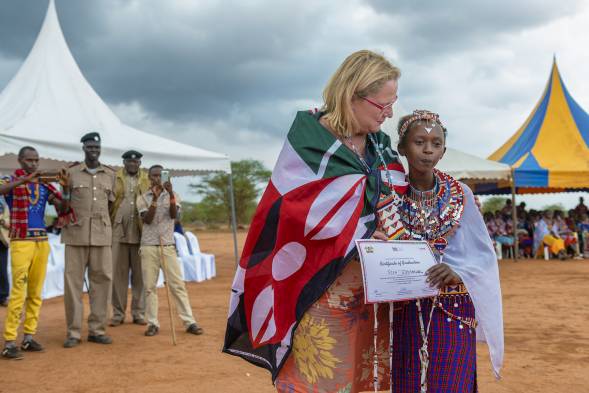
Credit: Jeroen Van Loon
Traveling with us to Lenkisem was Katja Iversen, the CEO of Women Deliver – a leading global advocacy organization for the health, rights and wellbeing of girls and women. Amref Health Africa had invited Katja to join us at this ARP as an international witness. It was inspiring to hear Katja speak with the girls, and to see her take away their messages of hope, which she can bring to the table in frequent discussions with global decision makers. My colleagues and I were energized by Katja’s insight towards creating a movement to eradicate FGM/C in Africa – something that Amref Health Africa aspires towards in our vision to end FGM/C in Africa by 2030.
Women Deliver invited The New York Times to witness the ARP, which led to the publication of an outstanding article in early January (published in both The New York Times and The Toronto Star). The article parlays my colleague Nice Nailantei Leng’ete’s moving journey from having escaped the practice of FGM/C at a young age, to mobilizing her community and others to abandon the cut. I may be biased, but I would have to say that it is a must-read!
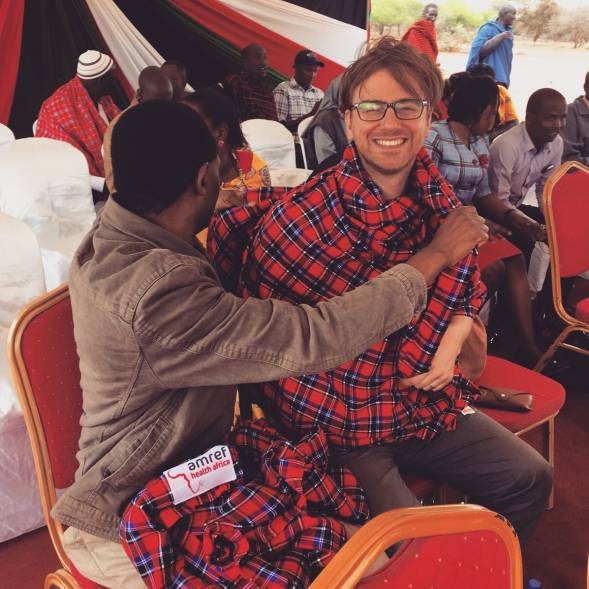
Credit: Helen Walker
I am inspired by my Amref Health Africa colleagues in Kenya, Tanzania and beyond who work tirelessly to eliminate FGM/C, and by the way in which we are collaborating across borders towards a shared goal. Our momentum continues to build, just like the momentum towards abandoning FGM/C continues to build in Maasai communities. And what is happening among the Maasai is an indication that violence against girls and harmful practices can indeed be stopped, and that the best way to do this is by empowering girls and communities to lead the way.

